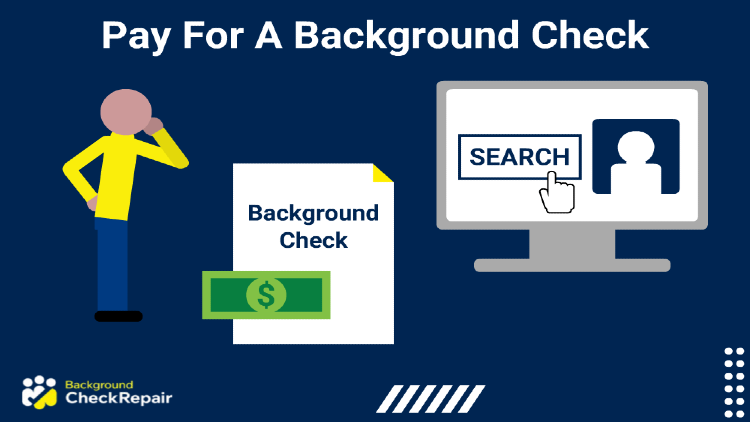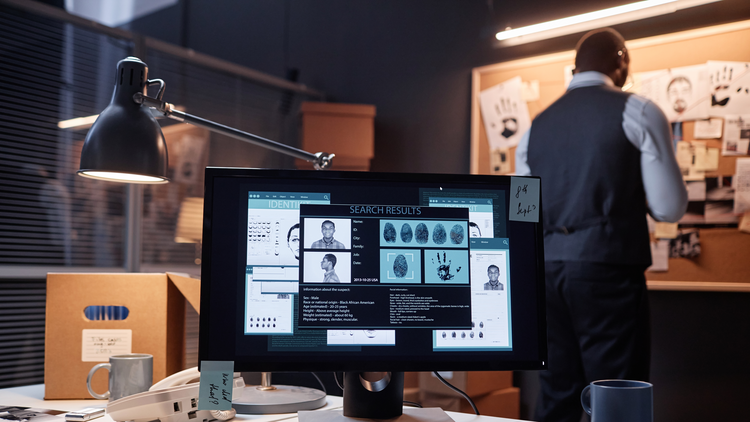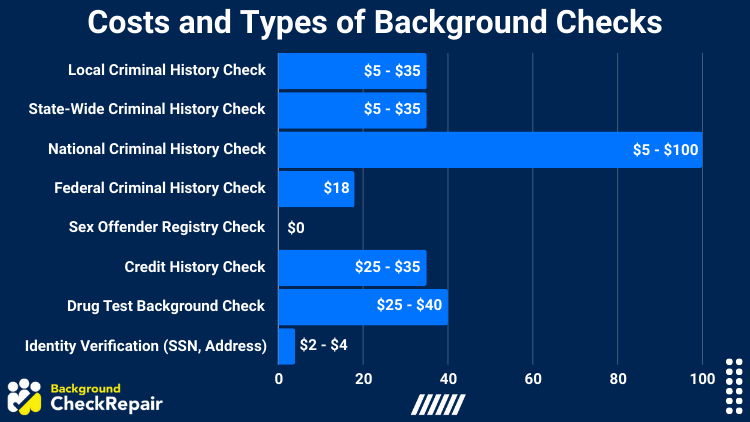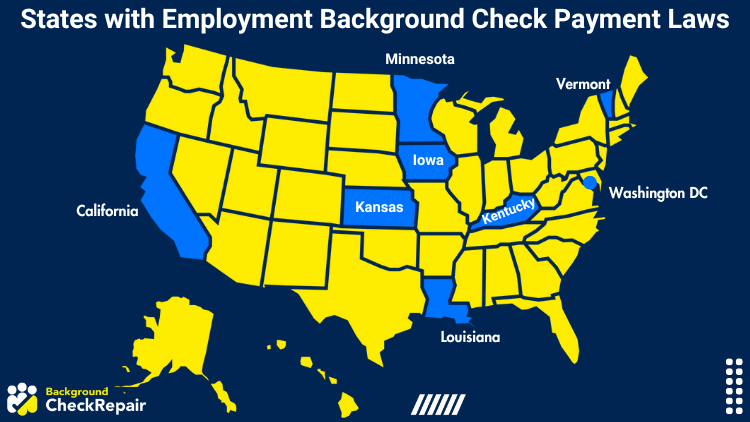Can an Employer Require an Employee To Pay for a Background Check?
Yes, although it is rare, only a few states specifically ban the practice of employers asking employees to pay for background checks.
 Written by Background Check Repair
Written by Background Check Repair
Background Checks | June 18, 2024

Table of Contents
With so many different options and background screening types available these days, it can be hard to tell how much to pay for a background check, or know how much are background checks. But there are certain steps that can be taken to get both discounts, and results instantly.
In some cases (like with a seven-day background check trial), individuals may wonder if they should pay at all for a basic level background screening or if they should only pay for a more thorough background screening.
But, discounts can be found by simply not overpaying for the wrong type of search. Furthermore, there is a real way to get a discount on certain background searches included below in the frequently asked questions at the bottom of the article.
For example, if someone is conducting a tenant background investigation, then there’s absolutely no reason to perform a complete Level 3 screening. On the contrary, if the position involves healthcare background check, it should include the FACIS search (Level 3 Background Check).
However, if someone just needs to know and determine someone’s birthdate details, an address search for who lives here, or a free name lookup by phone, then a personal, name-based background check will suffice.
The key to paying the lowest amount for a background check starts by understanding the type of background check required, especially when required by law because understanding the difference between levels can save tons of money.
The following guide outlines the cost of background checks and how much to pay for a background check, based on the type of information being searched.
The first thing to understand when deciding how much to pay for a background check is what kind of background check is needed. There are tons of different checks available for tons of different reasons.
Pre-employment background checks are the most common and likely what most people think of when they hear the term background check. However, even if an individual has undergone a background check as a condition of employment, they may still be in the dark about the process or how much it costs.
In general, expect to spend about $40 to pay for a background check.
But… that cost can be reduced, depending on the records needed.
In order to know exactly which background check to use, searchers should first examine state laws concerning which positions require background checks, but also consult with company resources (such as operational procedures) to determine what’s required.
For example, in one, the law may require that all childcare provider screening process be conducted using the FBI fingerprint system, but the company, or non profit organization might want an even more comprehensive search done, such as including an international background check.
The cost of the background check can be discounted by simply performing all the checks needed, without any additional ones. For most positions, a simple FCRA approved check is adequate, but other industries (like healthcare and education) can require more.
A common source of confusion with the term background check is that the term is often used interchangeably with the term “criminal history check.” However, a criminal history check is not exactly the same thing as a background check. Basically, a criminal history check is only part of a background check. Although, many people would consider it to be the most important part of a typical background check.

Using a standard pre-employment check as an example, such as one for an entry-level Home Depot retail job. A typical pre-employment background check will include most if not all of the following checks.
Identity and address verification are both fairly simple. Companies must confirm that an individual is who they say they are, and is eligible to work in the United States.
To do this they will check their name against the social security number the employee provided, as well as their address. Address verification is also important as part of the criminal history check as it allows the person performing the check to make sure they check for criminal history information from all the jurisdictions that the individual has lived in.
Education checks and professional license confirmation searches may be run to ensure the employee has the proper certifications and degrees etc. that they claim to have and may be required for the position they are applying for.
A criminal history check will determine if the individual has a record of committing crimes that may put the company or the employees at risk, should the individual be hired.
Background check costs vary for two main reasons. First, the source of the information varies, so oftentimes the person performing the check may have to search multiple sources individually to obtain all the necessary information. The second reason is that many of the sources and databases that are used cost money to search.
This is particularly true at the state level, which may require a searching fee.
Even with a basic background check, there are multiple costs that, although small on their own, can add up quickly. For more advanced background checks, there are additional costs associated as special databases must be checked, fingerprints must be gathered and run through criminal databases and more extensive criminal history checks must take place.
In short, background check costs vary because the sources of the information vary. With tons of databases all operated by different entities, the cost to maintain the databases is massive as well as the effort to search them all thoroughly. All these costs add up and are passed on to the consumer, the person requesting the background check.
Although costs of various checks vary, many of the basic checks will have a range of prices that individuals can expect to pay. Below is a list of common checks and the typical price range to perform the check.

| Type of Background Check | What to Pay for a Background Check |
| Local Criminal History Check | $5 – $35 |
| State- Wide Criminal History Check | $5 – $35 |
| National Criminal History Check | $5 – $100 |
| Federal Criminal History Check | $18 |
| Sex Offender Registry Check | $0 |
| Credit History Check | $25- $35 |
| Drug Test Background Check | $25 – $40 |
| Identity Verification (SSN, Address) | $2-$4 |
There are several key aspects that will dictate how much an individual will need to pay for a background check. Mainly, these are the company that is performing the check and the databases that are being accessed.
As mentioned, different databases have different costs required to access them and get copies of the information. So, when certain databases need to be accessed the price will rise. This is also the case for more thorough background checks that may require access to several databases.
Higher background check costs are especially common in industries that have specific rules regarding what must be checked as part of a pre-employment background screening. For example, the following checks are the federal requirements for child care employees:
This is only the federal requirements for a daycare employee’s background check, each state will also have additional checks that are required in order to be able to work with children unsupervised.
Knowing which type of check to conduct is the first step, but the second is knowing which background check company to use. For all professional background checks, FCRA compliant agencies and companies must be used.
Likewise, there are requirements for various industries, including workers who volunteer. (Quick note, many states offer volunteer screenings that are heavily discounted or without fees. Simply contact the state of residence’s Justice Department to learn more.)
With the cost of background checks varying based on how thorough, the check is, many people choose to go with a background check company that offers monthly memberships or a pre-set package price.
Large companies with a high number of employees usually go through a reputable background check company that will check virtually the same information for every employee all for a set price. This price is often lower than what it would cost to check each database individually and saves the hiring manager from having to spend potentially hours searching through databases for every employee.
The high cost associated with going through a reputable background check company has led many individuals to go the DIY route. In many situations, this is a totally viable option to avoid paying high fees for a service that is not necessary or will only be used a handful of times.
Businesses that only deal with a small number of employees may choose to run a background check themselves by checking state and national criminal databases and paying the associated fee. Although this will be more labor-intensive, in many cases it can be an economical option rather than going through a background check company. However, keep in mind that the FCRA rules apply, which means:
To ensure no liability, it is safer to have a dedicated agency perform any employment background checks.
Performing a criminal history check on someone is relatively easy and can usually be done without the written consent of the employee, something FCRA accredited background check companies will require.
All that is required is the name of the individual and any counties that they have lived in during the last several years. From here, the hiring manager only needs to check court records for each county by performing a name-based search and paying a small fee.
Unfortunately, even the fees for a simple criminal history check can vary dramatically. Although various laws make criminal history information available to the public, processing fees are still required to obtain them. In many cases the fee will be small, this is more common in jurisdictions that have extensive online databases that can be searched instantly from a computer. The fee usually goes to the agency that is in charge of the database, such as the state police or department of justice and is used to update and maintain the database.
Jurisdictions that do not have searchable online databases often require higher fees. This is because many jurisdictions have not yet digitized their records so certain information must be accessed by hand at the physical location of where the records are kept, such as the courthouse. It is also common to have to pay a fee for individual copies, although this is usually less than $5.
Federal background check fees are one of the few checks that should not vary and will always have the same price no matter where the requester lives. This is because all nation wide criminal background checks are completed using the FBI database, and conducted through the Criminal Justice Information System (CJIS), which the agency refers to as an Identity History Summary Check (IHSC).
To obtain an IHSC from the FBI, simply access the website of the FBI and follow the specific steps for obtaining one through the online portal or by mail. Regardless of the method chosen, the cost is $18. This covers all the fees, including the required fingerprints.
Background checks at the local level will vary from county to county. Although the FBI is the only agency that is in charge of performing background checks at the federal level, each state has different regulations and record-keeping methods.
In some cases, state background checks can be performed by the state’s department of justice or through an online portal through the state police department. However, even in states that offer this service, there are still several issues with this method.
The biggest issue is that although the state may be able to provide this information, normally the state is just providing information to the requester that was provided to the state by the local court. This means that not only is the information often more readily available from the county but also that the state records are often incomplete. Many states will have some counties that have digitized records and some that still rely on physical records.
If a crime was committed in a county that only has physical records, a name-based search through the state’s online system may not turn up these results. For this reason, it is best advised to perform a check through the state database, if one exists, and a local check which can be done at a police station.
Background checks at police stations will generally only cover local criminal history information or in some cases the criminal history information for the entire state. However, information from other states is usually not available.
The cost for a background check at a police station will vary by county but the cost is usually around $25 and rarely exceeds $40.
Many states have passed laws limiting the amount to pay for a background check.
See the table below to find out the maximum amount.
The reason that individuals must pay for a background check on themselves is the same as why they have to pay for any background checks: accessing the necessary databases costs money. One of the biggest differences when obtaining a background check on yourself compared to on another individual is that the process is usually easier.

In some cases, the process for obtaining your own background check information is expedited since certain permissions are not required.
Some states have specific laws when it comes to requesting background check information on yourself. This is often to help individuals get access to their own criminal history for various legal purposes.
Pre-employment background check fees are another common question amongst those getting background checks for the first time and amongst business owners who are considering developing background check procedures for new employees.

In general, it is fairly rare for an employee to have to pay for their own pre-employment background check. Although it is not completely unheard of, industry standards are that the business will pay for the background check on their applicants. Usually, the background check will come at the end of the hiring process, often as the last step, so by this point, most businesses are willing to invest in an employee that they believe is fit for the job.
Virtually every major company that operates in the U.S. such as Walmart, will pay for the background check. Often these companies will have large contracts with background check companies that make the cost of individual background checks incredibly low, due to the volume of checks that are performed by the company.
There are several exceptions to this however, for example, many healthcare workers and other types of caregivers will have to pay for their own background checks as part of receiving specific certifications that may be required for their field. Since the certification requires a background check and the job being applied for requires the certification, the business may only run a bare minimum background check on prospective employees.
Although the practice of an employee being forced to pay for their own background check is rare, there are only a few states that have specific laws banning the practice. That means that in many cases an employer asking an employee to pay for their own background check is totally legal.
Furthermore, even in states that have laws banning employers from forcing employees to pay for background checks, many of these laws only apply to statewide criminal history checks. In this case, the employer can still ask the employee to cover other background check-related costs for education checks, employment history checks, credit checks, etc.
As of 2022, there are only 8 states that have any kind of laws that prohibit employers from requesting payment for a background check. The law for each state varies in what is allowed and what is not.
California has one of the strictest laws, with the state forbidding employers from charging employees for “anything of value.” This includes not only background check fees but also application fees and other application-related processing fees.
Other states have less strong verbiage. For example, the District of Columbia makes it unlawful for employers to charge background check fees as part of the hiring process. However, the law does technically allow for an employer to seek reimbursement for the background check fee once it has been completed.
All states with background check pricing laws and the applicable law are provided below:

Background checks can be confusing enough and trying to understand specific laws for them at the state and federal level can only add to the confusion. Regardless of the cost of a background check, understanding specific laws can help individuals recognize how much to pay for a background check without being overcharged.
Yes, although it is rare, only a few states specifically ban the practice of employers asking employees to pay for background checks.
Yes, the best way to get a free background check on yourself is to use an online background check company that offers a free trial. Even if the company requires a small fee this can often be refunded if you simply call their customer support hotline.
First, be aware that only certain types of background searches will be eligible for a discount. These are name-based searches and cannot be used by employers or landlords. To receive a discount, simply run a background report and ask for a refund within 24 hours. Most background check companies have a policy that allows this. It is sometimes referred to as the “special discount method” but should not be abused.
Whether or not an applicant has to pay for a background check depends on the level of check being conducted. Most do-it-yourself checks are performed using state and federal resources, and there is a nominal fee associated with them (usually under $30). However, in some cases, using a free trial background check from an agency, can allow users to get a background check for free.
The reason that background checks require payment is because a number of databases are checked, which hold the records. Those databases do cost something to operate, so most local, state and federal checks require payment.
The exception to this is state and national sex offender registries, which can be checked for free. And, some state counties also allow users to conduct criminal history searches on themselves without charges.
Yes. When running a background check for personal or professional reasons, it is normal to pay for the service.
The cost of a background check varies, depending on the level and amount of information required.
With landlord and tenant background checks, every state has different rules and regulations, but many landlords shift the cost of a background check to the prospective tenant. So many do it, in fact, that it’s become fairly standard as part of the rental application process.
Most reputable sites (like background check agencies and government websites) allow users to pay for background checks online, using a number of methods.
Typically, most large companies do not require applicants to pay for their own background checks, including the cost as part of the hiring process. However, unless a specific state has regulations prohibiting it, an employer can ask that you pay for a background check, although it is very rare.
The price for a pre-employment background check can vary, depending on the state and the type of background check being performed.
Normally, background checks are paid online, using a safe system, such as PayPal or a verified safe platform that accepts credit or debit cards.
We use cookies to ensure that we give you the best experience on our website. If you continue to use this site we will assume that you are happy with it